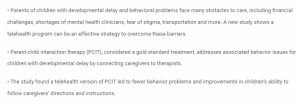|
Getting your Trinity Audio player ready...
|
 Telehealth programs for parents can improve the behavioral problems of children with developmental delay, according to new research.
Telehealth programs for parents can improve the behavioral problems of children with developmental delay, according to new research.
Psychology Professor Daniel M. Bagner and his team at FIU’s Center for Children and Families led the first study of its kind, published in JAMA Pediatrics, to investigate how using videoconferencing to provide live coaching of caregiver-child interactions impacted children with developmental delay. They found the telehealth program led to fewer child behavior problems, like aggression, as well as improvements in the children’s ability to follow their caregivers’ directions and instructions — better preparing them for kindergarten.
“Even with the increase in telehealth mental health services during the pandemic, there’s very little scientific evidence that this type of treatment works, especially for families with young children with developmental delay,” Bagner said. “Our findings show the benefits of telehealth, and the promise it can have in expanding the service and care, especially for underserved families and children at risk for more severe problems later in life.”
Children are diagnosed with developmental delay when they are behind in specific areas, compared to their peers. For example, language and speech delays remain one of the most common developmental delays, and most children in this study had speech and language delays.
Previous research has shown developmental delay diagnosis puts children at three times the risk of developing behavioral problems. While current early intervention services focus on treating the delays, they don’t address the associated behavior problems.
That’s where parent-child interaction therapy (PCIT) comes in. Considered a gold-standard treatment for young children with behavioral problems, PCIT therapists provide live, in the moment, coaching to caregivers on how to manage their child’s behavior and improve their relationship with their child.
In their study, Bagner and the team tested a telehealth-delivered version of PCIT — called Internet-delivered Parent-Child Interaction Therapy (iPCIT) that provided the same live coaching to parents, only through a webcam.
They recruited 150 children with developmental delay and behavior problems from Early Steps — Florida’s early intervention system. Many of the participants were from traditionally underserved families. More than 90% of the children belonged to ethnic or racial minority groups, and more than half lived in poverty.
In addition to children showing reduced behavior problems after iPCIT, the results of the study showed that caregiver behavior improved — meaning there was a decrease in harsh and inconsistent discipline and an increase in positive behaviors, such as praise. Bagner says this finding is encouraging because these parenting behaviors have been shown to predict long-term positive outcomes in children with developmental delay, such as their ability to cope with frustrating situations and interact positively with their peers.
“Parents of children with developmental delay and behavioral problems face many barriers as they seek care, including transportation obstacles, language barriers, financial challenges, shortages of mental health clinicians and fear of stigma,” Bagner said. “We hope this study shows telehealth can be an effective strategy to address many of these barriers.”
The study was funded by the National Institute of Child Health and Human Development (NICHD).
Bagner and the CCF team have expanded their research looking at the impact of parenting programs. Currently, they are leading a 5-year NICHD-funded prevention program to support families with very young children — between 12 and 18 months old — at risk for behavior problems. For more information or to participate in this study, please click here.
Publication information: Telehealth Treatment of Behavior Problems in Young Children With Developmental Delay A Randomized Clinical Trial, JAMA Pediatrics. doi:10.1001/jamapediatrics.2022.5204





